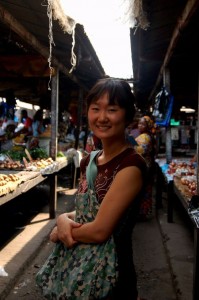I thought you might like to have a look at a few more of the first clients in their homes and businesses. Enjoy!
Becky Svendsen
By Becky Svendsen
Staff / Travels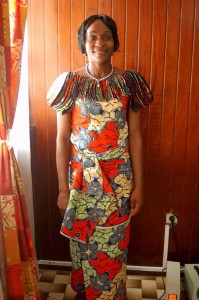 Most of the women in Brazzaville wear beautiful dresses or skirts made of pagne, a brightly colored fabric that comes in bold, interesting patterns. Women buy the relatively inexpensive fabric in the pagne sections of the market and then take their selections to one of hundreds of local tailors. These tailors can create customized and detailed dresses, shirts, and suits at impressive speeds. Mikhal (HOPE Congo’s Finance Manager and my amazing hostess!) helped me buy fabric and commission a few skirts from a tailor named Bienvenu. Continue Reading…
Most of the women in Brazzaville wear beautiful dresses or skirts made of pagne, a brightly colored fabric that comes in bold, interesting patterns. Women buy the relatively inexpensive fabric in the pagne sections of the market and then take their selections to one of hundreds of local tailors. These tailors can create customized and detailed dresses, shirts, and suits at impressive speeds. Mikhal (HOPE Congo’s Finance Manager and my amazing hostess!) helped me buy fabric and commission a few skirts from a tailor named Bienvenu. Continue Reading…
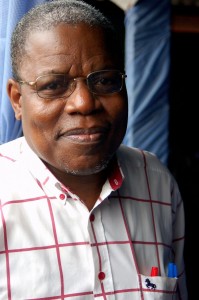 I had the opportunity to interview Pasteur Julien from Centre Chrétienne Néhémie (Nehemiah Christian Center Church) while a reimbursement meeting was taking place in his church.
I had the opportunity to interview Pasteur Julien from Centre Chrétienne Néhémie (Nehemiah Christian Center Church) while a reimbursement meeting was taking place in his church.
• Thus far, what has been your interaction with HOPE Congo?
“HOPE Congo invited me to speak at the first disbursal meeting on behalf of all the churches in Brazzaville. I came here to pray with the clients and to help HOPE Congo launch their affairs. … I told clients, ‘You can be motivated, earn more money, and make great plans, but without God being a part of your plans, without following His will, it will all be useless in the end.’” Continue Reading…
Becky Svendsen
By Becky Svendsen
Stories we loveBecky Svendsen
By Becky Svendsen
Staff / Travels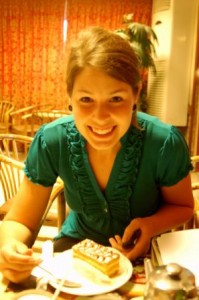 When European powers sat down to divide Central Africa amongst themselves in the nineteenth century, today’s Republic of Congo became a colony of France. Although Congo gained independence in 1960 and you might not be able to tell at first glance, ties between the two countries are still strong. For better or worse, France has left an indelible impression on Congo’s culture, government, and economy. The official language of business and academia is French (the Congolese are way ahead of Americans with fluency in multiple languages), and many Western expats and major business owners are French. One of the happier results: you don’t have to look too far to get a good croissant, or as I was happy to find, a mil feuille (I’ve also heard it called a napoleon).
When European powers sat down to divide Central Africa amongst themselves in the nineteenth century, today’s Republic of Congo became a colony of France. Although Congo gained independence in 1960 and you might not be able to tell at first glance, ties between the two countries are still strong. For better or worse, France has left an indelible impression on Congo’s culture, government, and economy. The official language of business and academia is French (the Congolese are way ahead of Americans with fluency in multiple languages), and many Western expats and major business owners are French. One of the happier results: you don’t have to look too far to get a good croissant, or as I was happy to find, a mil feuille (I’ve also heard it called a napoleon).
Becky Svendsen
By Becky Svendsen
News Staff / TravelsI just wanted to throw in a plug for HOPE’s internship program. Every year, HOPE puts 15-20 interns to work in the field and in the Central Service Unit in Lancaster, PA (Yeah intern class of 2007!). It’s an awesome opportunity to learn, grow, and play a valuable role in the alleviation of physical and spiritual poverty. Sa-Eun (pictured) arrived about a week after I did to serve as an intern in HOPE Congo’s Operations department, and she’s already living and breathing Christ-centered microfinance. She’s spending her time interviewing clients, establishing baseline metrics, translating, facilitating data collection processes, and finding ways to make client identifications more efficient. If you know any college students with the head of a banker, the heart of a missionary, and the soul of a development worker, have them check out HOPE’s internship program at www.hopeinternational.org.






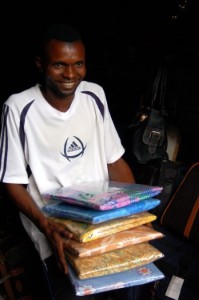

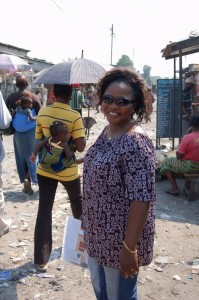 Meet Loveline, HOPE Congo’s first loan officer supervisor. Loveline played a valuable role in assembling and training the first 50 clients, and she is also managing and training the current staff of two loan officers. She provides an important layer of internal controls and efficiency for HOPE Congo’s work. Honestly, when I think about Loveline, the first phrase that comes to mind is “rock star.”
Meet Loveline, HOPE Congo’s first loan officer supervisor. Loveline played a valuable role in assembling and training the first 50 clients, and she is also managing and training the current staff of two loan officers. She provides an important layer of internal controls and efficiency for HOPE Congo’s work. Honestly, when I think about Loveline, the first phrase that comes to mind is “rock star.”